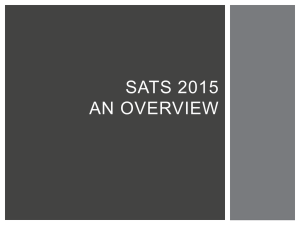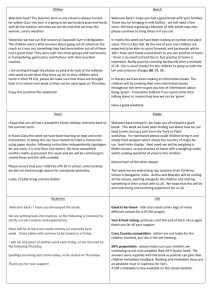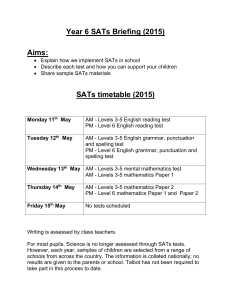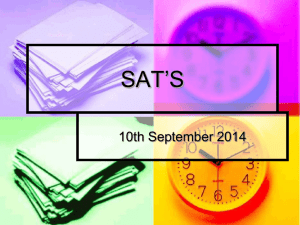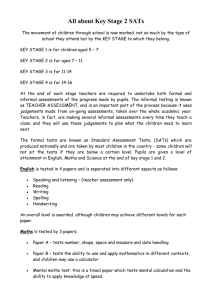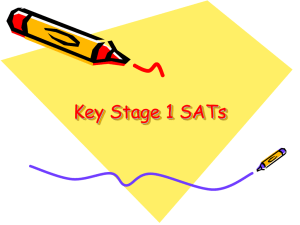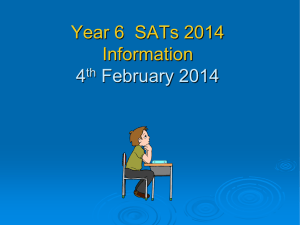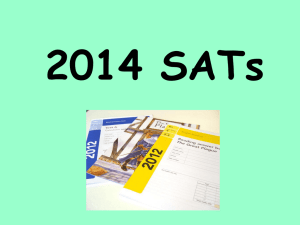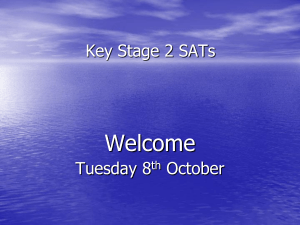Key Stage 2 SATs 2016 - St. Joseph's RC Primary School
advertisement
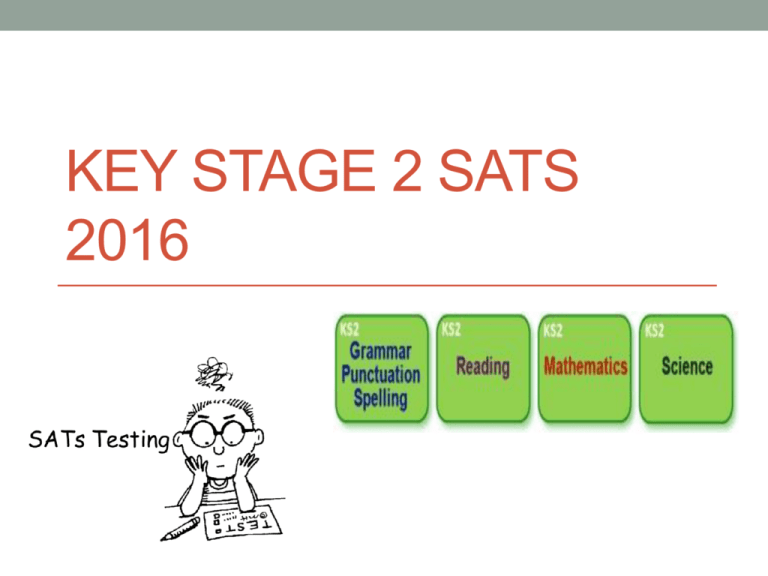
KEY STAGE 2 SATS 2016 Session Aims • To understand what SATs are and why we have them. • What will be different in SATs 2016? • To share timetable for SATs 2016. • What we are doing as a school to help children prepare. • How parents can support their children at home. What are SATs/ • SATs stands for Standard Assessment Tests • In Primary schools, they are done at the end of Key Stage 1 (Year 2) and at the end of Key Stage 2 Year (Year 6). • All Year 6 children across the country will sit the same tests during the same week. Purpose of the SATs • To hold schools accountable for the achievement of their pupils • To publish results in league tables so that parents are aware of standards • To inform parents of children’s attainment and progress N.B. Tests establish what children can do on one day –not all of the time. Children cannot fail them! SATs 2016 • Confirmed- a similar structure to previous years. Tests in Reading, SPAG (Spelling, grammar and punctuation) and Maths. • Science – random sampling of schools. What’s new? • Confirmed that there is only one suite of tests. There is no equivalent • • • • • of the Level 6 Test, although the new tests will have difficult questions to assess the ability of more able pupils. Maths – no longer a mental maths test. Although there is a new Arithmetic Test. There will be no levels and results will be reported in scaled scores (standardised scores). These to be set once the tests go live. Pupils who may not make the expected standard (100+) are still expected to take the test. Questions on Maths and SPAG Tests will become more difficult as the children work through them. In Reading – first text is easy – last is more difficult. However, questions are in order of the text content. What’s new cont. English: • NO FLEXIBILITY FOR PUPILS WHO STRUGGLE TO SPELL • Handwriting – unless the child has a physical difficulty, it must be legible Maths: • No CD (like the Mental Maths Paper), just written tests • Specific methods to be taught in the curriculum What are Scaled Scores? • Scaled scores are used all over the world. • They will place a child on a scale of achievement where 100 represents the ‘national standard’. • The score of 100 is intended to reflect the same standard every year. • For example, if a child received a scaled score of 120, they would have achieved above the national average What should most children achieve? • The typical characteristics of pupils at the national standard are illustrated by the test performance descriptors. • These are included in the 2016 KS2 interim assessment framework. The Timetable for SATs 2016 Week beginning 9th May 2016 English Reading Test Monday 9th May English grammar, punctuation and spelling test Paper 1: short answer questions Paper 2: spelling Tuesday 10th May Mathematics Paper 1: arithmetic Paper 2: reasoning Wednesday 11th May Mathematics Paper 3: reasoning Thursday 12th May Structure of the Reading Test Sample Reading Questions Structure of the Maths Test Secure use of written methods will be essential. Sample Maths Questions Sample Maths Questions The Grammar, Punctuation and Spelling Test (SPAG) This year, marks will be deducted if sentences are not punctuated with full stops and capitals or if the capital letter does not look like a capital letter! Furthermore, if capital letters are wrongly included, they will also not receive a mark for that answer. Upper and lower case letters must be clear. Writing Assessments • There is no written ‘test’ as such. • Writing judgements are based on teacher assessment only but may be moderated by local authority representatives. • Throughout the year we have been, and will continue to, assess the children’s writing. • This continues until the end of the year. Sample SPAG Questions Science Tests All pupils who are registered at maintained schools in England and are at the end of key stage 2 will be eligible to be selected to take part in the key stage 2 science sampling test. This will run from 6th -17th June 2016 Receiving their results • For the Reading, GPS and Mathematics tests you will receive: • a raw score (number of raw marks awarded) • a scaled score (a comparable score for each subject) • confirmation of whether or not they attained the national standard • For writing you will be told if your child is: • working within the expected range of attainment for his/her age • working below • working towards • working beyond SATs at St. Joseph’s • Nothing to worry about! We want your child to take them seriously but do not want them to panic. • We will provide your child with the best possible opportunity to reach their potential so there will be lots of practice tests, working to time frames etc. • Your child may be given extra support in the run up to SATs in Reading, Writing or Maths • These sessions will be on a one to one or small group basis and may take place before, during or after school. We therefore need you to help by allowing your child to attend these sessions. How Parents Can Help • Ensuring your child is in school. Please do not book any holidays. • Make sure they have a quiet organised place to do their homework, with necessary equipment – SATs revision guides provided by school, pens/pencils, internet etc. • Ensuring your children get into the habit of doing their homework and returning it to school promptly. • Ensuring they are able to get a good night’s sleep so they are properly rested. • Listening to them read, asking questions about their reading. Reassure them that as long as they do their best that is all that matters! The tests are a way of showing what they know, not of catching them out. What Will We Do? • Provide booster clubs for identified children • Organise one to one or small group sessions where • • • • children will focus on areas of specific weaknesses Give relevant homework Provide ‘Revision Guides’ for every child Set specific learning targets Breakfast club during SATs week Life after SATs in Year 6 • Children will continue to be taught, learn and have lessons that cover all aspects of the curriculum. These lessons will support pupils in their transition to Secondary School and in being life long learners. • Some examples of learning opportunities that they will have are: Project work Bridging Curriculum for secondary transition (Kenzuki’s Kingdom) Science and maths investigation work Computing workshops Personal, Social and Spiritual education …..and of course a treat to the Bowling Alley!
